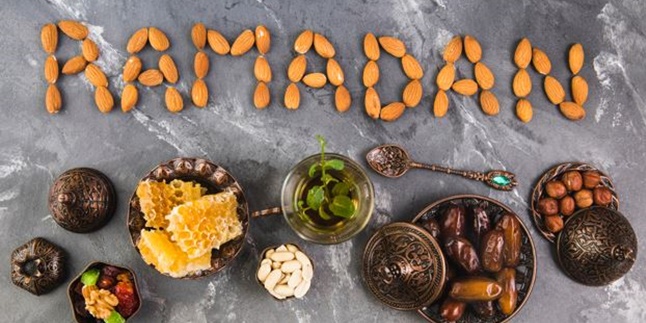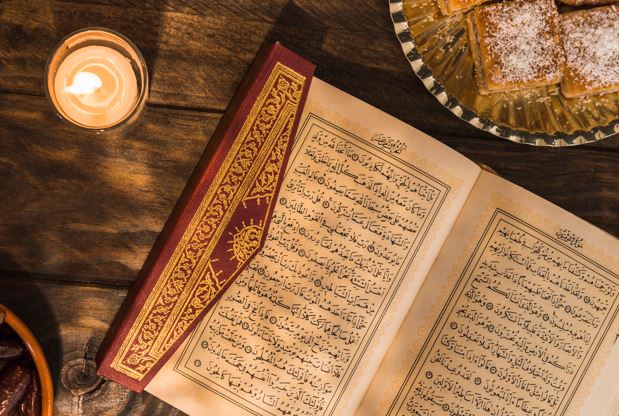10 Easy and Natural Ways to Get Rid of Foot Odor
Having foot odor can make us feel insecure. Here are some natural ways to get rid of foot odor. Let's check it out.

Kapanlagi.com - Ramadan is the most special and eagerly awaited month for Muslims. It is during this month that good deeds are multiplied. Therefore, Muslims compete to perform worship, one of which is fasting.
Fasting itself means restraining oneself from eating, drinking, and any actions that can invalidate the fast. Fasting is done from dawn until sunset, with certain conditions. Of course, this is to increase the piety of a Muslim.
For this reason, Muslims continue to strive to pay attention to the ethics of fasting. This was also recommended by the Prophet Muhammad when he observed Ramadan fasting. The following are tips from the Prophet Muhammad when observing Ramadan fasting:

(credit: freepik)
Prophet Muhammad SAW advised Muslims to delay Sahur when approaching Imsak.
Prophet Muhammad SAW said: Have Sahur, for Sahur contains blessings.
So, Sahur is a meal full of blessings. Zaid bin Tsabit said, We used to have Sahur with the Prophet Muhammad. Then we performed prayers. Then I asked: How long is the time between them (between Sahur and prayer)? The Prophet answered: The recitation of fifty verses. (HR. Authentic)

(credit: freepik)
When it is time to break the fast, Prophet Muhammad advised to hasten the Iftar.
Prophet Muhammad SAW said:
People will always be in goodness as long as they hasten the Iftar. (HR. al-Bukhari and Muslim)
When the time of breaking the fast has come, hasten the Iftar, for there is much goodness in it. Therefore, Allah loves those who hasten the Iftar.

(credit: freepik)
After a day of not consuming water and food due to fasting, the body's fluid needs decrease. When breaking the fast, the Prophet Muhammad recommended eating or drinking something sweet.
If one of you is breaking the fast, let him break it with dates. If he cannot find dates, then let him break it with water because water is pure. (HR. Imam Lima)
Eating 3 dates and drinking 2 tablespoons of honey after suhoor and iftar or as a snack (after the main meal) is very good for the body. The high calorie content in dates and honey can provide enough energy for daily activities and to stay strong while fasting.

(credit: freepik)
Rafast is an act of disobedience or engaging in sexual intercourse while fasting. The Prophet Muhammad said:
If one of you is fasting, then he should not engage in rafast.
Furthermore, when fasting, one should avoid all forbidden actions such as gossiping, vulgar language, and lying. Because forbidden actions can nullify the entire reward of fasting. The Prophet Muhammad said:
How many people fast but gain nothing from their fasting except hunger.

(credit: freepik)
Ramadan is one of the months where people compete to seek the pleasure of Allah. Various good deeds are done while fasting, one of which is reading the Quran.
Imam Az-Zuhri said, When Ramadan comes, our main activity besides fasting is reading the Quran. Read it with good tajweed and contemplation, understand and practice its contents.
In the month of Ramadan, the Quran was first revealed. Therefore, reading the Quran is commanded by the Prophet during the month of Ramadan. In fact, the Prophet read the Quran more often in this month compared to other months.

(credit: freepik)
During fasting, it is important to restrain oneself from anger and emotions. Hunger and thirst often make people easily provoked emotionally. By getting angry, it can diminish the perfection of fasting itself.
The Prophet Muhammad said:
And if someone attacks or insults him, then he (the person fasting) should say: I am fasting, I am fasting.
The expression (I am fasting) is a reminder for oneself and a reminder for the opponent. Therefore, it is good to always maintain calmness and control desires to avoid anger.

(credit: freepik)
Zakat fitrah is a personal zakat that is obligatory for every capable male and female Muslim. Zakat fitrah is performed one day before the end of the month of Ramadan. According to Ibn Umar, recorded in HR. Muslim, that:
From Ibn Umar, indeed the Prophet Muhammad SAW has made zakat fitrah obligatory in the month of Ramadan for people with 1 sha' of dates or 1 sha' of wheat, obligatory for free individuals, slaves, males and females, from the Muslim community.
Thus, zakat fitrah is obligated and must be fulfilled before the end of the month of Ramadan.
Those are the tips for fasting in Ramadan recommended by Prophet Muhammad SAW. Hopefully, they can be beneficial in daily life and bring us closer to Allah SWT.
(kpl/dtm/gen)
Cobain For You Page (FYP) Yang kamu suka ada di sini,
lihat isinya
Having foot odor can make us feel insecure. Here are some natural ways to get rid of foot odor. Let's check it out.
Are you planning to train your child to fast during Ramadan this year? If so, read 10 tips for training children to fast during Ramadan in this article.
Having scars on the skin can make someone feel uncomfortable because they interfere with appearance. Especially if the scars are in areas that are not covered by clothing, of course, it makes you feel less confident.
There are several habits that are synonymous with Ramadan. Unfortunately, there are habits in Ramadan that should not be done during the current corona virus pandemic. So, what are those habits? Let's find out in this article.
Several steps have been taken to break the chain of Covid-19 transmission. However, it seems that this is not fully implemented by the community. The government's efforts are being violated by some people with various accompanying reasons. So, why does this happen?
Still confused about what to do while fasting in the midst of the Covid-19 coronavirus pandemic? Here's the answer, let's check it out.
Dealing with the bodies of Covid-19 corona virus victims cannot be done like regular bodies. Find the procedure for dealing with the bodies of Covid-19 corona virus victims in this article.
Apparently, Zam Zam water has several interesting facts. These facts prove that Zam Zam water is a special water. Let's take a look.
Visiting graves has become a tradition before Ramadan in Indonesia. But what are the procedures for visiting graves according to Islam? Find the answers in this article.
Having thick eyebrows is every woman's dream. By using some natural ingredients, you can naturally get thicker eyebrows. Let's take a look.
During fasting, there are certainly prohibitions that should not be done. Of course, this is avoided to maximize fasting worship so that it is not canceled. However, do you know? It turns out there are several things that are allowed to be done while fasting?
Ciplukan fruit has many health benefits. What are the benefits of ciplukan fruit? Find the answers in this article.